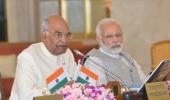The Bharatiya Janata Party's splendid performance in the four states ruled by it, sweeping away opposition parties with its governance model mounted on pillars of welfarism, Hindutva and Prime Minister Narendra Modi's unflagging popularity, has made it the firm favourites for the 2024 Lok Sabha elections, just like its victory in a similar round of polls in 2017 had smoothed out its path for the 2019 general election win.

The astonishing rise of the Arvind Kejriwal-led Aam Aadmi Party outside its Delhi turf, with an unprecedented mandate in Punjab and a toehold in Goa, also foretells a big likely churn in the opposition camp.
The Congress continues to decline and the BJP's regional rivals are making their presence felt, even in Uttar Pradesh where Samajwadi Party consolidated anti-BJP votes to a large extent.
With UP Chief Minister Yogi Adityanath set to achieve the maiden feat of an incumbent returning to power in the state after serving a full term, BJP's emphatic win, if not as sweeping as in 2017, has made him all but first in a shrinking list of his party's regional satraps, more so as a very few of them symbolise its ideological purity combined with an image of a tough administrator like him.
Also, the wholehearted endorsement of Yogi Adityanath from Modi in a manner that few BJP chief ministers have had during polls, evident from the viral photographs of the prime minister taking a stroll with him with hand on his shoulder, created a buzz around him in political circles that will be further reinforced by this victory.
Always admired by the votaries of hardcore Hindutva and nationalism, the 49-year-old leader's law and order plank has received wide public approval and added to his CV in terms of governance.
With the Uttar Pradesh win boosting his stature, there is a view that the priest-politician may get a place at the BJP high table with a berth in its parliamentary board, the highest decision-making body of the party.
However, political observers believe that the most significant message of the polls is also the most obvious and enduring one and that is -- Modi remains the most magnetic draw for voters towards the BJP-- and is once again highlighted by the party's all-around winning show in the recent assembly elections except Punjab. BJP is also set to return to power in Uttarakhand, Goa and Manipur.
This is the first time that the incumbent party has retained power in Uttarakhand even though its chief minister, Pushkar Singh Dhami, lost his own seat.
In Goa, the BJP will head a government for a third straight term with a much bigger mandate than last time.
Voters may have grievances, but many of them continue to see the prime minister as their best hope to tackle problems confronting the country and do not trust the message of opposition parties, projected by the BJP as symbols of dynastic corrupt rule.
Significantly, according to the Election Commission data, the BJP is appeared to have garnered more votes than 2017 in Uttar Pradesh but has not been able to match its 2017 seat tally due to a consolidation of opposition votes in the favour of the Samajwadi Party, which received more seats as against in 2017 but still fell far short of the ruling party.
That the BJP has won in in Uttarakhand and Goa despite its state governments facing perceived anti-incumbency, only validates the long-held criticism, political watchers believe, that the Congress has become too weak to put up a strong fight against the saffron party where it is the main challenger.
Political strategist Prashant Kishor has consistently cited the Congress's abysmal scorecard against the BJP in Lok Sabha and state polls to suggest a case for regional satraps to take lead in putting up a united front against the ruling party.
The rise of the AAP will only add to the growing noise in the opposition camp against the Congress as the BJP sits pretty.










